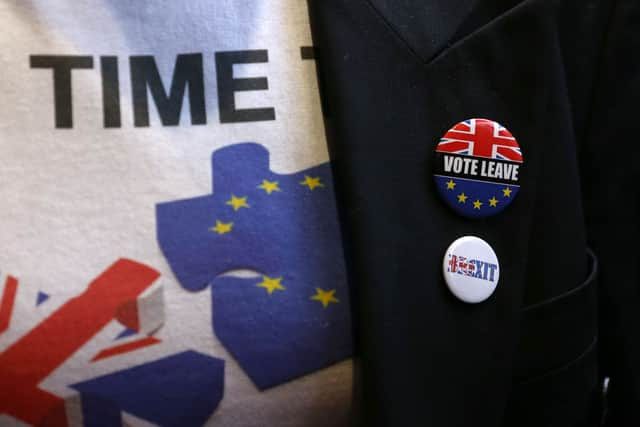Brexit has cost the British film and TV industry millions in lost investment from EU-funded arts schemes
and live on Freeview channel 276
Britain has contributed a lot to world cinema and television - two of the highest-grossing film franchises of all time, James Bond and Harry Potter, are quintessentially British projects, and UK made programmes such as Derry Girls have found international acclaim.
Some of the greatest directors of all time, among them Danny Boyle, Ken Loach, Sam Mendes and Alfred Hitchcock, are Brits, and the country has given cinema some of its finest stars - from Charlie Chaplin to Anthony Hopkins, Julie Andrews to Keira Knightley.
Advertisement
Hide AdAdvertisement
Hide AdDespite these contributions to world cinema, Britain is at risk of becoming a shrinking force in the land of film and TV due to the devastating double whammy of the global pandemic and Brexit.
In the cost benefit analysis of the fateful Brexit referendum of June 2016, it's getting every harder to find a silver lining among the many problems - in fact it seems that there's almost no sector of the UK economy that hasn't taken a hit as a result of Britain leaving the EU.
Ardent Brexiteers may be keen to blame every failing on the effects of the pandemic, and whilst that is certainly a factor, it's not the whole story. A look at Britain's film and TV industry post-Brexit is emblematic of the hurdles Britain elected to give itself.


How has Brexit affected the British film and TV industry?
A 2017 BFI report argued that a form of Brexit which resulted in an agreement with the European Free Trade Association (an intergovernmental organisation of Iceland, Liechtenstein, Norway and Switzerland) would be the "most favourable outcome for the UK’s screen sector".
Advertisement
Hide AdAdvertisement
Hide AdThe process of leaving the EU was an arduous one, but on 31 January 2020, three and half years after the referendum, the UK did just that. On New Year’s Day 2021, the UK left the single market and customs union.
In July 2021, the UK signed a free trade agreement with the EFTA states Iceland, Liechtenstein, and Norway (an agreement with Switzerland had already been agreed).
The EFTA agreement allowed for the temporary admission of filming equipment into EFTA states without import costs. The agreement has seen closer ties between the film sectors of the UK and the EFTA, with Norway providing an £800,000 investment for an episode Working Title’s The Devil’s Star, which was filmed in the country.
However, aside from these relatively small wins involving a limited number of non-EU countries, Brexit has not marked a success for the British film and TV sectors - in fact it has seen the loss of many important avenues of investment.


Advertisement
Hide AdAdvertisement
Hide AdThe UK no longer participates in Creative Europe, EU’s support programme for the cultural and audiovisual sectors, despite the BFI’s attempts to keep the UK in the group. This means that the UK is not involved in the 2021-2027 programme of investment. In 2017, MEDIA, a sub-programme of Creative Europe, invested £4.4 million in UK-based film activity.
Creative Europe also supported the distribution of 115 UK films in countries across Europe from 2014-2016 with an €18 million investment. Films which benefited from this investment included I, Daniel Blake, Paddington, and Pride. Over the same period 55 UK cinemas in the Europa Cinemas network benefited from grants totalling €22 million. Due to Brexit, no UK cinemas are part of the Europa Cinema network and will no longer benefit from these grants.
Whilst plenty of projects continue to be filmed in the UK, including Indiana Jones and the Dial of Destiny, AppleTV series Blitz, season two of Amazon Prime series Lord of the Rings: The Rings of Power, and the final season of Netflix historical drama The Crown (all American projects), the diminished investment in British productions is hard to ignore.
The precise impact of Brexit on box office takings is difficult to determine because of the devastating effect of the Covid-pandemic, which saw the total British box office fall from £1.26 billion in 2019 to around £320 million the following year. The British box office is still yet to return to pre-pandemic numbers, and one British cinema CEO predicted that this would take several more years.
Advertisement
Hide AdAdvertisement
Hide AdBy removing British film and TV from a European club in which it benefited from a shared investment pot is unlikely to prove a benefit, and in the long term British films are likely to see lower ticket sales across Europe without the support in international distribution.
Comment Guidelines
National World encourages reader discussion on our stories. User feedback, insights and back-and-forth exchanges add a rich layer of context to reporting. Please review our Community Guidelines before commenting.
